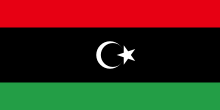
The politics of Libya has been in an uncertain state since the collapse of the Libyan Arab Jamahiriya in 2011 and a recent civil war and various jihadists and tribal elements controlling parts of the country. On 10 March 2021, the interim Government of National Unity (GNU), unifying the Second Al-Thani Cabinet and the Government of National Accord was formed, only to face new opposition in Government of National Stability, until Libyan Political Dialogue Forum assured the ongoing ceasefire.
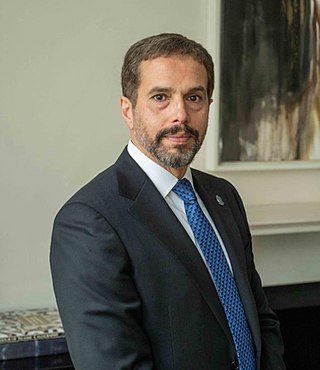
Mohammed El Senussi is the son of Crown Prince Hasan as-Senussi of Libya, and of Crown Princess Fawzia bint Tahir Bakeer. Born in Tripoli, he is considered by Libyan royalists to be the legitimate heir to the Senussi Crown of Libya.

The National Front for the Salvation of Libya (NFSL) was a political opposition group active during the rule of the Gaddafi regime in Libya. It was formed in 1981 and called for major liberalising reforms such as democratic elections, a free press, and the separation of powers. During the 1980s, it pursued a campaign of armed opposition to the Gaddafi regime and made several coup attempts, the most notable being its 1984 armed assault on Gaddafi's Bab al-Azizia compound in Tripoli. After the failure of this and several other coup attempts the group largely abandoned militancy, and instead used peaceful tactics to promote reform in Libya; in 2005, the NFSL joined with six other groups to form the National Conference for the Libyan Opposition.

The Constitution of Kuwait was created by the Constitutional Assembly in 1961–1962 and signed into law on 11 November 1962 by the Emir, the Commander of the Military of Kuwait Sheikh Abdullah III Al-Salim Al-Sabah.

The Libyan civil war or the 2011 Libyan revolution, also known as the First Libyan Civil War was an armed conflict in 2011 in the North African country of Libya that was fought between forces loyal to Colonel Muammar Gaddafi and rebel groups that were seeking to oust his government. The war was preceded by protests in Zawiya on 8 August 2009 and finally ignited by protests in Benghazi beginning on Tuesday, 15 February 2011, which led to clashes with security forces who fired on the crowd. The protests escalated into a rebellion that spread across the country, with the forces opposing Gaddafi establishing an interim governing body, the National Transitional Council.

Mustafa Abdul Jalil is a Libyan politician who was the Chairman of the National Transitional Council from 5 March 2011 until its dissolution on 8 August 2012. This position meant he was de facto head of state during a transitional period after the fall of Muammar Gaddafi's government in the Libyan Civil War, and until the handover of power to the General National Congress.
The international reactions to the Libyan Civil War were the responses to the series of protests and military confrontations occurring in Libya against the government of Libya and its de facto head of state Muammar Gaddafi.

The anti-Gaddafi forces, also known as the Libyan opposition or Libyan rebels, were Libyan groups that opposed and militarily defeated the government of Muammar Gaddafi during the First Libyan Civil War in 2011, killing him in the process. The Anti-Gaddafi forces were represented by the National Transitional Council and their National Liberation Army, which claimed to be the "only legitimate body representing the people of Libya and the Libyan state". These opposition forces included organized and armed militia groups, participants in the Libyan Civil War, Libyan diplomats who switched their allegiance from the Gaddafi-led government, and Libyan military units that switched sides to support the protesters.

The National Transitional Council (NTC) was a transitional government established in the 2011 Libyan civil war. The rebel forces overthrew the Libyan Arab Jamahiriya of Muammar Gaddafi. The NTC governed Libya for a period of ten months after the end of the war, holding elections to a General National Congress on 7 July 2012, and handing power to the newly elected assembly on 8 August.
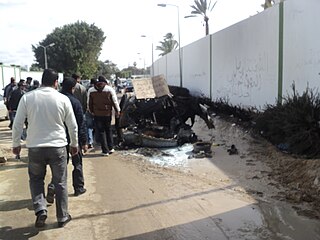
United Nations Security Council Resolution 1970 was a measure adopted unanimously by the UN Security Council on 26 February 2011. It condemned the use of lethal force by the government of Muammar Gaddafi against protesters participating in the Libyan Civil War, and imposed a series of international sanctions in response.

Abdul Hafiz Ghoga is a Libyan human rights lawyer who rose to prominence as the spokesman for the National Transitional Council, a body formed in Benghazi during the 2011 Libyan civil war. On 23 March 2011, he became the vice chairman of the council, serving in that post until he resigned on 22 January 2012 after protests against him.
Khamis Gaddafi was the seventh and youngest son of former Libyan leader Muammar Gaddafi, and the military commander in charge of the Khamis Brigade of the Libyan Army. He was part of his father's inner circle. During the Libyan Civil War in 2011, he was a major target for opposition forces trying to overthrow his father.
Estimates of deaths in the 2011 Libyan civil war vary with figures from 15,000 to 30,000 given between March 2 and October 2, 2011. An exact figure is hard to ascertain, partly due to a media clamp-down by the Libyan government. Some conservative estimates have been released. Some of the killing "may amount to crimes against humanity" according to the United Nations Security Council and as of March 2011, is under investigation by the International Criminal Court.
Free speech in the media during the Libyan civil war describes the ability of domestic and international media to report news inside Libya free from interference and censorship during the civil war.
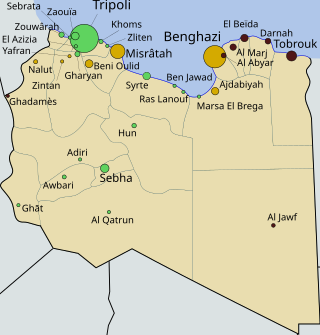
The Libyan Civil War began on 15 February 2011 as a chain of civil protests and later evolved into a widespread uprising against the regime of Muammar Gaddafi. On 25 February, most of eastern Libya was reported to be under the control of protesters and rebel forces. Gaddafi remained in control of the cities of Tripoli, Sirte and Sabha. By 15 March, however, Gaddafi's forces had retaken more than half a dozen lost cities. Except for most of Cyrenaica and a few Tripolitania cities the majority of cities had returned to Gaddafi government control.
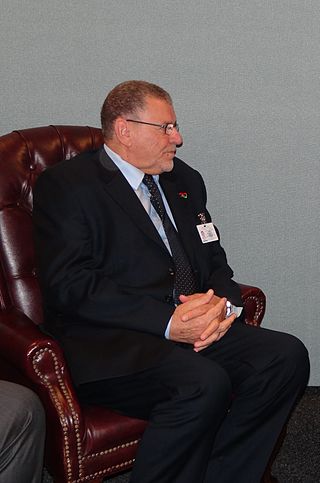
Ashour Ben Khayal, sometimes romanised Ben Hayal, is a Libyan diplomat and politician who was born in the Cyrenaican city of Derna in September 1939. He was named Foreign Minister on 22 November 2011 by Abdurrahim El-Keib in a surprise move, as the position was originally reported to be filled by Libya's deputy ambassador to United Nations Ibrahim Dabbashi. He was described as little-known prior to his appointment.
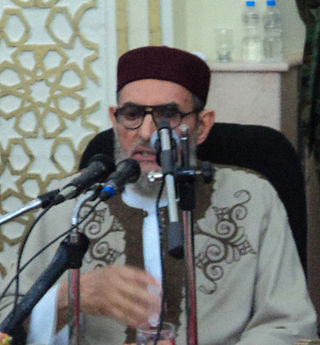
Al-Sadiq Abd al-Rahman Ali al-Ghariani has been the Grand Mufti of Libya since 2012. He is a Muslim imam of the Maliki school of thought. Academically he is a seated professor in the College of Sharia in the University of Tripoli since 1969 and distinguished contributor the Maliki school of thought with his numerous publications.
The following lists events that happened during 2011 in Libya.

Hisham Ben Ghalbon is a founding member and spokesman for Libyan Constitutional Union (LCU) and was an opponent of the regime of Libyan leader Muammar Gaddafi since the mid 1970s when Ben Ghalbon was a student at the faculty of Engineering in the University of Tripoli.
